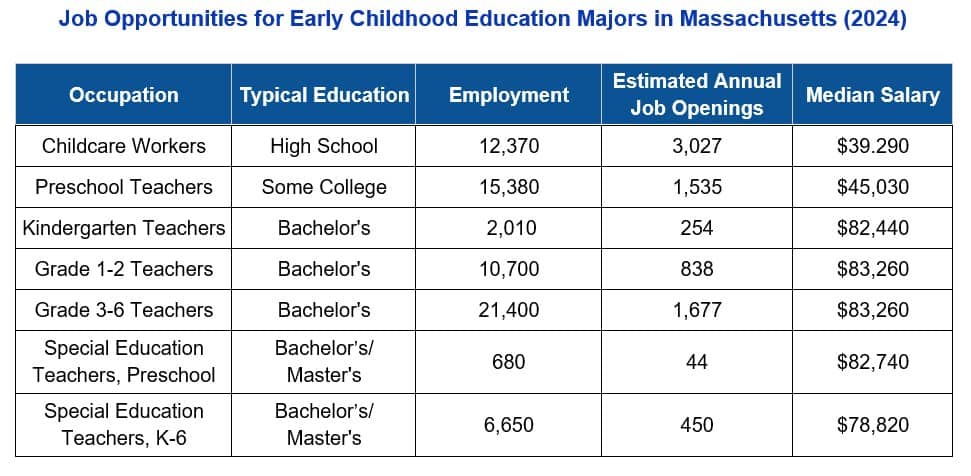For anyone planning to study early childhood education in college, there’s good news: there are plenty of job opportunities in this field. Unfortunately, the vast majority pay far less than public school teacher positions. Childcare workers and preschool teachers, who work primarily in private daycare and preschool programs, earn about half as much as public school kindergarten and elementary school teachers in Massachusetts. But there are often far fewer openings for these better-paying public school positions. There are an estimated 1,092 job openings yearly for kindergarten and grade 1-2 teachers compared to 4,562 openings for childcare workers and preschool teachers. (See table below.)

How to Improve Your Chances of Landing a Better-Paying Job
If you’re planning to study early childhood education and hoping to find a position with a strong starting salary, here are some strategies to help you improve your chances of landing a better-paying job in the field.
Enroll in an Early Childhood Education Program That Leads to a Pre-K-Grade 2 Initial License
To teach in the public schools, you will need a Pre-K-Grade 2 state license. Some colleges (e.g., UMass Boston) offer two Early Childhood Education tracks—one that qualifies you to work in daycare, preschool, and afterschool programs, and a second track that includes the courses and teaching practicums required to earn a Massachusetts license to teach in Pre-K through Grade 2 public classrooms. Make sure you enroll in the option that qualifies you for the state licensure exams.
Pursue Licensure in Special Education or Reading
Public school systems offer preschool programs for young children ages 3-5 with diagnosed special needs that pay salaries on par with other teaching positions in the district. These public preschool programs typically require candidates to have a special education license. Similarly, most school districts in the state prefer candidates for teaching positions in kindergarten and early elementary grades with advanced training and licensure in special education or reading. Earning an additional license in special education or as a reading specialist will boost your chances of securing a good first job in a public school district. Most colleges with early childhood education programs offer students the option of staying an additional year to complete a master’s degree or postbaccalaureate certification in special education or reading. Some colleges offer special education as a bachelor’s degree option.
Consider Earning an Elementary Education Degree
A degree in Elementary Education will qualify you to teach grades K-6 in public schools, expanding the pool of well-paying jobs to pursue. You can still focus on the early grades through coursework and student teaching assignments.
Explore Alternative Careers Working with Young Children
School districts employ Speech Language Pathologists to work with young children on a range of language acquisition and communication issues. The median salary for Speech-Language Pathologists working in Massachusetts was $101,790 in 2024 according to the Bureau of Labor Statistics. Three public colleges—Bridgewater State, Worcester State, and UMass Amherst—offer graduate programs in speech language pathology and undergraduate pre-speech pathology programs. Pre-speech pathology majors who perform well in the classroom and clinical experiences have a good chance of gaining admission to the master’s program at their college or elsewhere. Northeastern, Emerson, and Boston University also offer speech pathology programs.
As you explore different options to earn your college degree, look ahead to future careers and potential earning power to help you make your decision. With purposeful planning and a clear understanding of the job market, you can turn your passion for working with young children into a sustainable and rewarding career.














